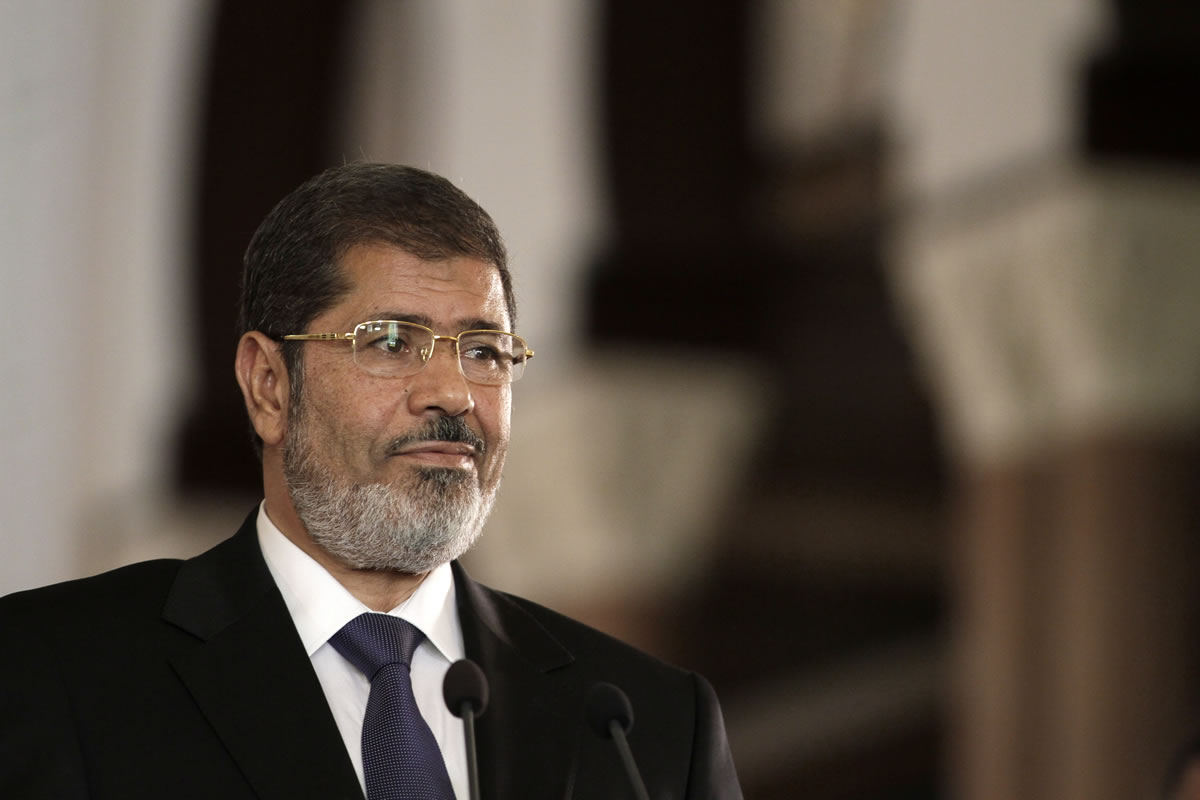CAIRO — The politically charged trial of Egypt’s Mohammed Morsi will begin Nov. 4, almost four months to the day after the country’s first democratically elected president was toppled by the military, authorities said Wednesday.
The prosecution of Morsi on charges of inciting his followers to kill opponents of his rule takes the crackdown on his Muslim Brotherhood to a new level and is likely to fuel protests by his Islamist supporters, stoking the turmoil shaking Egypt.
Since his July 3 ouster, Morsi’s backers have taken to the streets in rallies met by a fierce response by security forces that has left hundreds dead.
Wednesday’s announcement comes as the United States announced it was cutting hundreds of millions of dollars in annual aid to Egypt and its military — a show of discontent with the crackdown aimed at pressuring the interim leadership to move quickly toward a democratically elected government.
For Egypt’s military-backed government, the trial is a chance to lay out its justification for the sweeping arrest campaign and ultimately for Morsi’s ouster. Authorities contend the former president and the Brotherhood, which dominated power during his year in office, committed crimes while in power — and have turned to violence since his removal.
But the military, now Egypt’s dominant political power, also opens itself up to criticism it is carrying out show trials to crush the Brotherhood, which accuses the army and its supporters of wrecking Egypt’s fledgling democracy.
Already there are questions whether the trial, in which Morsi and 14 other members of his Brotherhood are defendants, can be fair.
Morsi has been held in secret military detention since his ouster, with almost no contact with the outside world beyond two phone calls with his family. During his interrogation, his defense lawyers have not been allowed to talk to him and say they have not been shown any documentation of the prosecution’s case.
“This is a trial held under the cannon of a tank,” said Mohammed Gharib, a member of Morsi’s legal team. “Is this an atmosphere for a fair trial?”
Rights lawyers point out that they tried to have the case prosecuted while Morsi was in office, a sign that it is not purely based on vengeance.
Hoda Nasrallah, a prominent human rights attorney, said the case has merits and is not simply political. “But there are definitely political purposes … and score-settling,” she acknowledged.
The case also is a new landmark in the political convulsions rocking Egypt over the past 21/2 years. With Morsi going to court, two ex-presidents will be on trial at the same time. Longtime autocrat Hosni Mubarak, toppled in 2011, is undergoing a retrial on charges he was complicit in the killings of protesters against his rule.
A string of trials have begun or are in the works against some 2,000 leaders and members of the Brotherhood arrested in the past three months, most on charges of inciting violence. Prosecutors are also investigating Morsi on possible further charges of insulting the judiciary and conspiring with the Palestinian militant group Hamas to carry out attacks in 2011 that broke Morsi and other Brotherhood leaders out of prison.
The military ousted Morsi after millions took to the streets demanding he leave office. After riding to political dominance on a series of election victories, Morsi and the Brotherhood had come under a massive backlash from a public that accused them of trying to monopolize power.
Since Morsi’s removal, a court has ordered the Brotherhood banned and its assets confiscated, while authorities and the media have depicted the former president’s supporters as a violent movement threatening the nation’s security. Public anger against the group has been deepened by an evolving insurgency by Islamic militants, many of whom backed Morsi while in office. Since his fall, militants have escalated attacks on police, the military, and — most recently — on civilian infrastructure.



